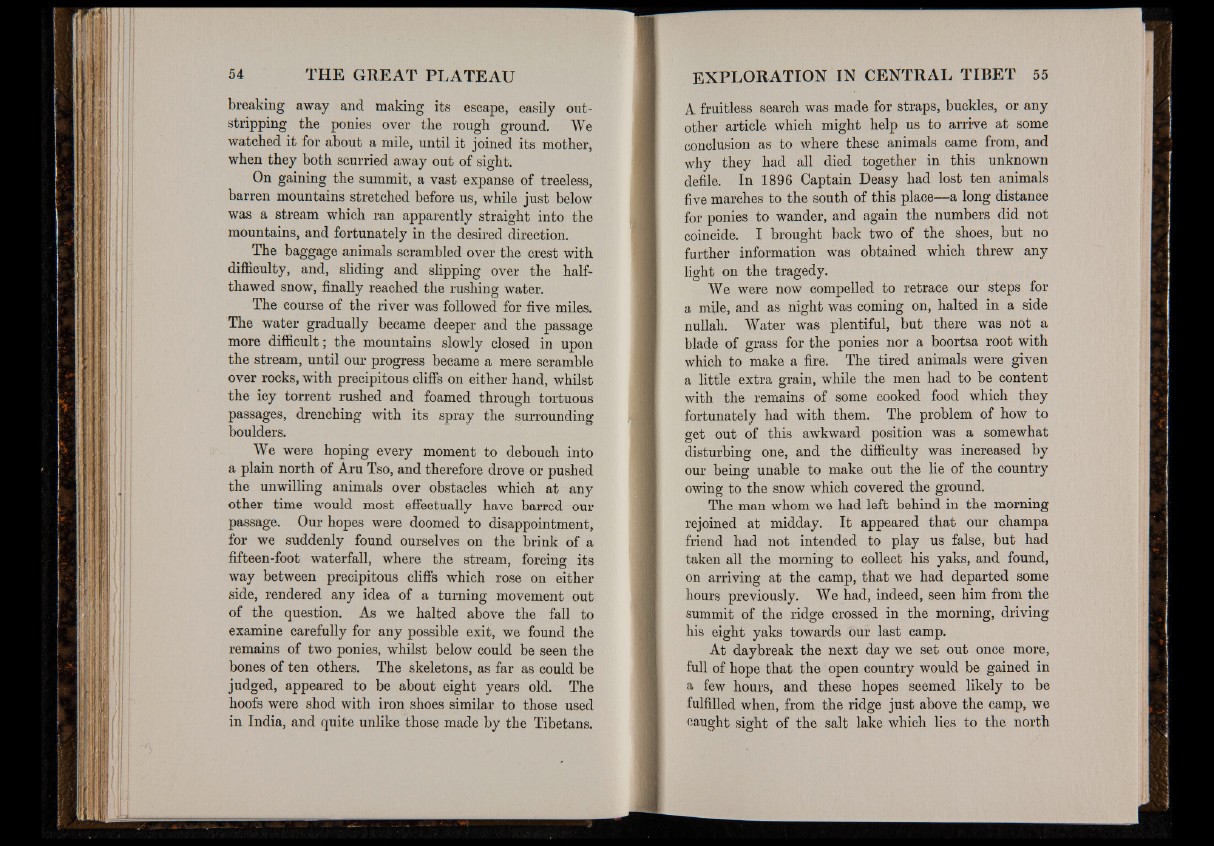
breaking away and making its escape, easily outstripping
the ponies over the rough ground. We
watched it for about a mile, until it joined its mother,
when they both scurried away out of sight.
On gaining the summit, a vast expanse of treeless,
barren mountains stretched before us, while just below
was a stream which ran apparently straight into the
mountains, and fortunately in the desired direction.
The baggage animals scrambled over the crest with
difficulty, and, sliding and slipping over the halfthawed
snow, finally reached the rushing water.
The course of the river was followed for five miles.
The water gradually became deeper and the passage
more difficult; the mountains slowly closed in upon
the stream, until our progress became a mere scramble
over rocks, with precipitous cliffs on either hand, whilst
the icy torrent rushed and foamed through tortuous
passages, drenching with its spray the surrounding
boulders.
We were hoping every moment to debouch into
a plain north of Aru Tso, and therefore drove or pushed
the unwilling animals over obstacles which at any
other time would most effectually have barred our
passage. Our hopes were doomed to disappointment,
for we suddenly found ourselves on the brink of a
fifteen-foot waterfall, where the stream, forcing its
way between precipitous cliffs which rose on either
side, rendered any idea of a turning movement out
of the question. As we halted above the fall to
examine carefully for any possible exit, we found the
remains of two ponies, whilst below could be seen the
bones of ten others. The skeletons, as far as could be
judged, appeared to be about eight years old. The
hoofs were shod with iron shoes similar to those used
in India, and quite unlike those made by the Tibetans.
A fruitless search was made for straps, buckles, or any
other article which might help us to arrive at some
conclusion as to where these animals came from, and
why they had all died together in this unknown
defile. In 1896 Captain Deasy had lost ten animals
five marches to the south of this place—a long distance
for ponies to wander, and again the numbers did not
coincide. I brought back two of the shoes, but no
further information was obtained which threw any
light on the tragedy.
We were now compelled to retrace our steps for
a mile, and as night was coming on, halted in a side
nullah. Water was plentiful, but there was not a
blade of grass for the ponies nor a boortsa root with
which to make a fire. The tired animals were given
a little extra grain, while the men had to be content
with the remains of some cooked food which they
fortunately had with them. The problem of how to
get out of this awkward position was a somewhat
disturbing one, and the difficulty was increased by
our being unable to make out the lie of the country
owing to the snow which covered the ground.
The man whom we had left behind in the morning
rejoined at midday. It appeared that our champa
friend had not intended to play us false, but had
taken all the morning to collect his yaks, and found,
on arriving at the camp, that we had departed some
hours previously. We had, indeed, seen him from the
summit of the ridge crossed in the morning, driving
his eight yaks towards our last camp.
At daybreak the next day we set out once more,
full of hope that the open country would be gained in
a few hours, and these hopes seemed likely to be
fulfilled when, from the ridge just above the camp, we
caught sight of the salt lake which lies to the north